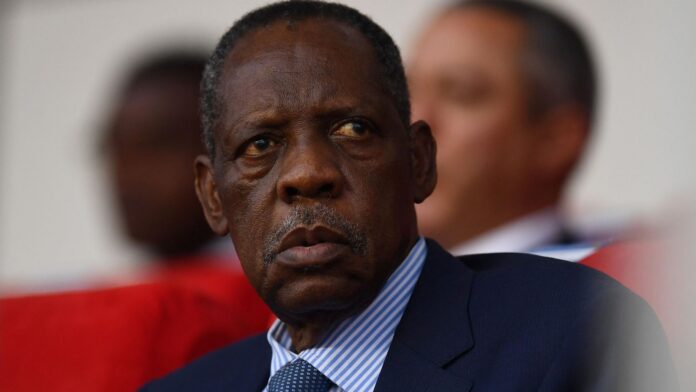When it comes to writing the history of the Confederation of African Football (Caf), the figure of Issa Hayatou will loom large.
Following his death on Thursday, the Cameroonian has been hailed as a steadfast and pan-African leader, and one who strongly defended the continent’s interests over the course of his 29-year reign as Caf president.
He also held high office in world governing body Fifa, including a brief spell as its acting president, and was a member of the International Olympic Committee (IOC).
Hayatou died aged 77 in Paris, where he had spent much time receiving dialysis for kidney problems.
His time at Caf was littered with historical firsts as well as controversy, but one constant was the iron first with which he ruled.
Path to the top
The son of a local ruler from Garoua, in younger days Hayatou became a national track champion over 400m and 800m and also represented Cameroon in basketball at the All Africa Games.
In 1974, aged 28, he took his first posts in sports administration when he became secretary general of Cameroon’s football federation (Fecafoot).
Just over a decade later he graduated to president of Fecafoot.
By 1986 he was elected onto Caf’s executive committee, was head of the continental body within two years and a Fifa vice-president within five.
But for a man who dominated African football for so long – revolutionising it in many areas – Hayatou only won his first Caf presidential election by the skin of his teeth.
His victory, by four votes, ushered in a new era.
Hayatou pledged to increase competition, revenue, credibility and relations with Fifa and other confederations and delivered on many of his promises.
“President Hayatou was always able, through his leadership, his interpersonal skills, and his sense of pragmatism, to defend the voice of Africa. We owe him a lot,” Fecafoot’s current president Samuel Eto’o said.
Broadening opportunities
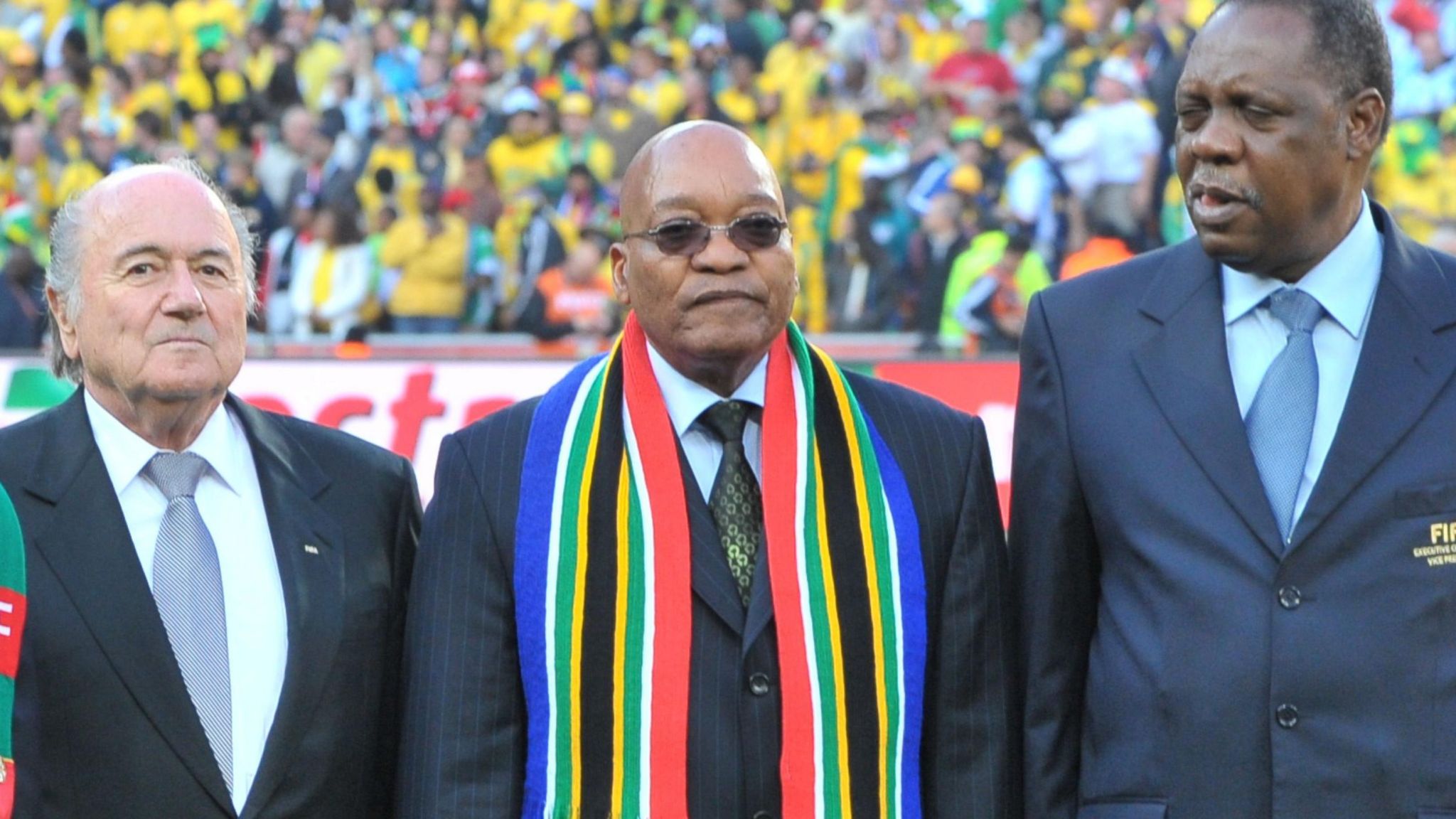 Image source: Getty Images
Image source: Getty Images
Image caption: Africa hosted the Fifa World Cup for the first time during Hayatou’s spell as Caf boss – although then-Fifa president Sepp Blatter (left) was the driving force behind the move
Hayatou was incredibly conscious of Caf having enough money to run its projects and transformed the organisation’s balance sheet.
Having inherited just $1.25m (£1m) in the bank, Caf was $130m (£102m) in the black when he left office in 2017.
When it came to matters on the field, former Caf secretary general Hicham El Amrani said Hayatou provided more competition “to allow for both infrastructure and player development.”
Women’s, Under-17 and Under-20 versions of the Africa Cup of Nations were introduced.
With the number of European-based players ever-increasing at the Nations Cup, which he expanded from eight to 16 teams, Hayatou created the African Nations Championship to give domestic-based footballers a chance to shine.
Hayatou was also fervent in his belief that the Nations Cup finals should remain in a January-February slot, amid outcry from European clubs.
Hayatou also increased African representation at the World Cup from just two teams in 1990 to five guaranteed participants – the second-best representation after Europe – when the tournament expanded in 1998.
Hayatou was also incredibly proud about the World Cup coming to Africa for the first time when South Africa hosted in 2010 – even if Fifa president Sepp Blatter was the driving force in that development.
Scandal and bribery allegations
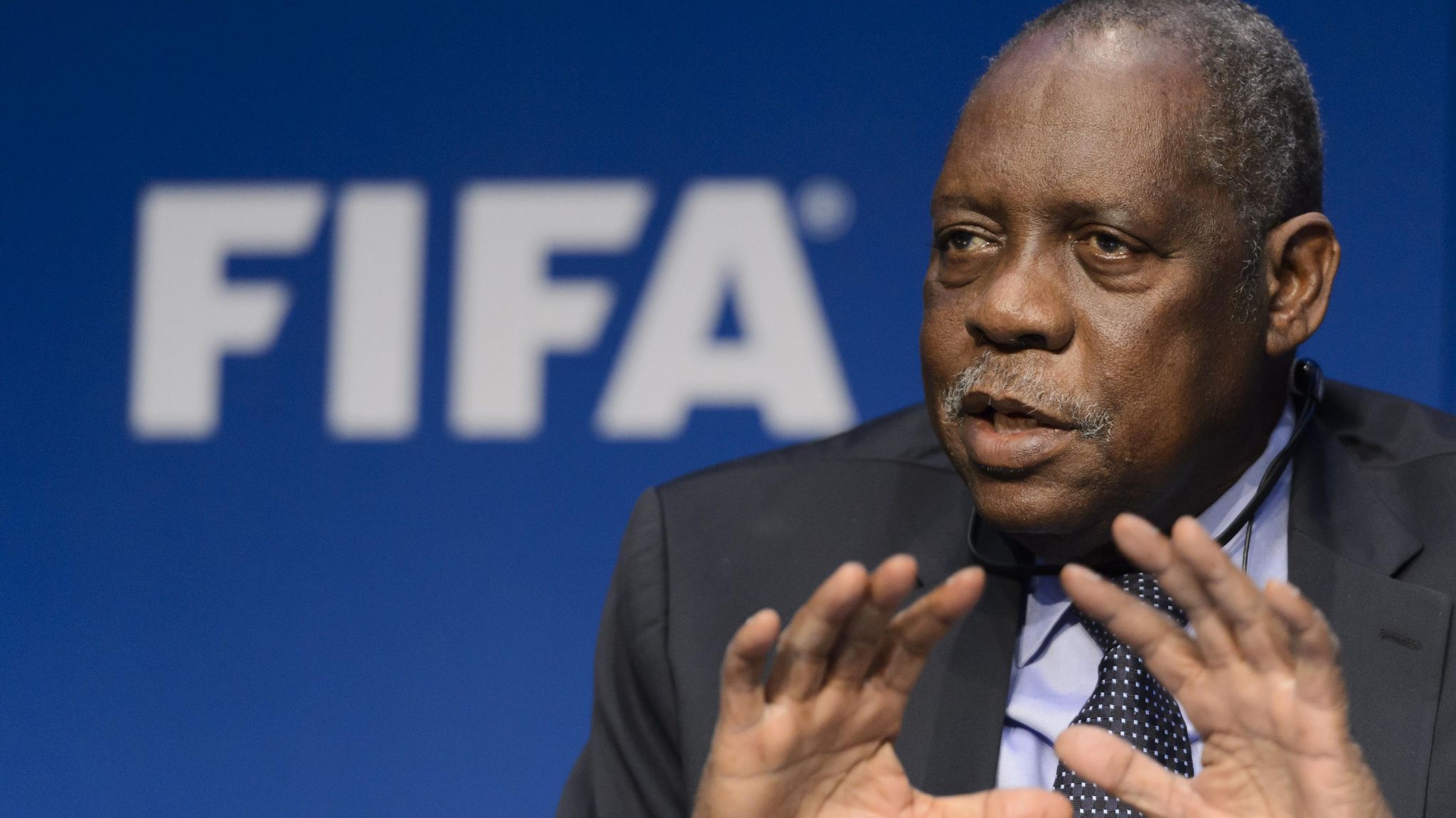 Image source: Getty Images
Image source: Getty Images
Image caption: Hayatou became Fifa’s acting president in 2015 when the Zurich-based body was hit by scandal
Over the course of almost three decades at the top it was inevitable that Hayatou would be implicated in scandals.
Perhaps the biggest stain on his reputation was when he was caught up in the scandal surrounding ISL (International Sport and Leisure), the firm which was awarded lucrative World Cup broadcasting rights but then collapsed in 2001.
Paperwork found by the BBC showed that Hayatou had received a sum totalling nearly $20,000 (£15,700) in 1995.
He denied any wrongdoing and said the payment was a gift for Caf. At the time, it was not a criminal offence to receive such money.
Fifa took no action against Hayatou but the IOC acted differently, reprimanding the Cameroonian for his actions – saying they constituted a conflict of interest.
Arguably more serious was the allegation from a whistle-blower that Hayatou, along with a fellow Caf official, had accepted $1.5m (£1.18m) in bribes from Qatar in 2010 to secure support for its ultimately successful bid for the 2022 World Cup.
Once again, the Cameroonian denied the charges, with no action ever taken against him.
The signing of a deal worth $1bn (£780m) with French media rights company Lagardere in 2015 – one of Hayatou’s last major acts as Caf president – also proved controversial.
In August 2021 Hayatou was handed a one-year ban by Fifa for breaching its code of ethics, nominally for putting pen to paper without the full approval of Caf’s executive committee.
The sanction was overturned by the Court of Arbitration for Sport, which found no justification for Fifa’s actions.
Response to deadly attack in Angola
 Image source: Getty Images
Image source: Getty Images
Image caption: An attack on Togo’s delegation on the eve of the 2010 Nations Cup led to an increased security presence in host nation Angola
How Hayatou and Caf reacted to tragedy in 2010, when two members of Togo’s delegation were shot dead by militants on the eve of the Nations Cup finals in Angola, did cause outrage.
After withdrawing from the competition, Caf chose to ban the West Africans from the next two editions of the tournament.
It may have been technically within the organisation’s rules, but the decision showed neither appreciation for force majeure nor basic common decency.
Togo were eventually reinstated.
Yet, on another level, Caf’s unpublicised actions showed considerable insight into Hayatou’s thinking as a leader.
I was astonished to learn that Caf had responded with incredible speed once it had received news of the incident, scrambling helicopters and other support vehicles to the site to help those injured.
When I asked why Caf had chosen not to announce this Hayatou simply said: “Why should we need to publicise what we have done?”
In truth, this was a direct response to his upbringing as the son of a sultan in northern Cameroon.
The ruler’s words and decisions were final, with no explanation required.
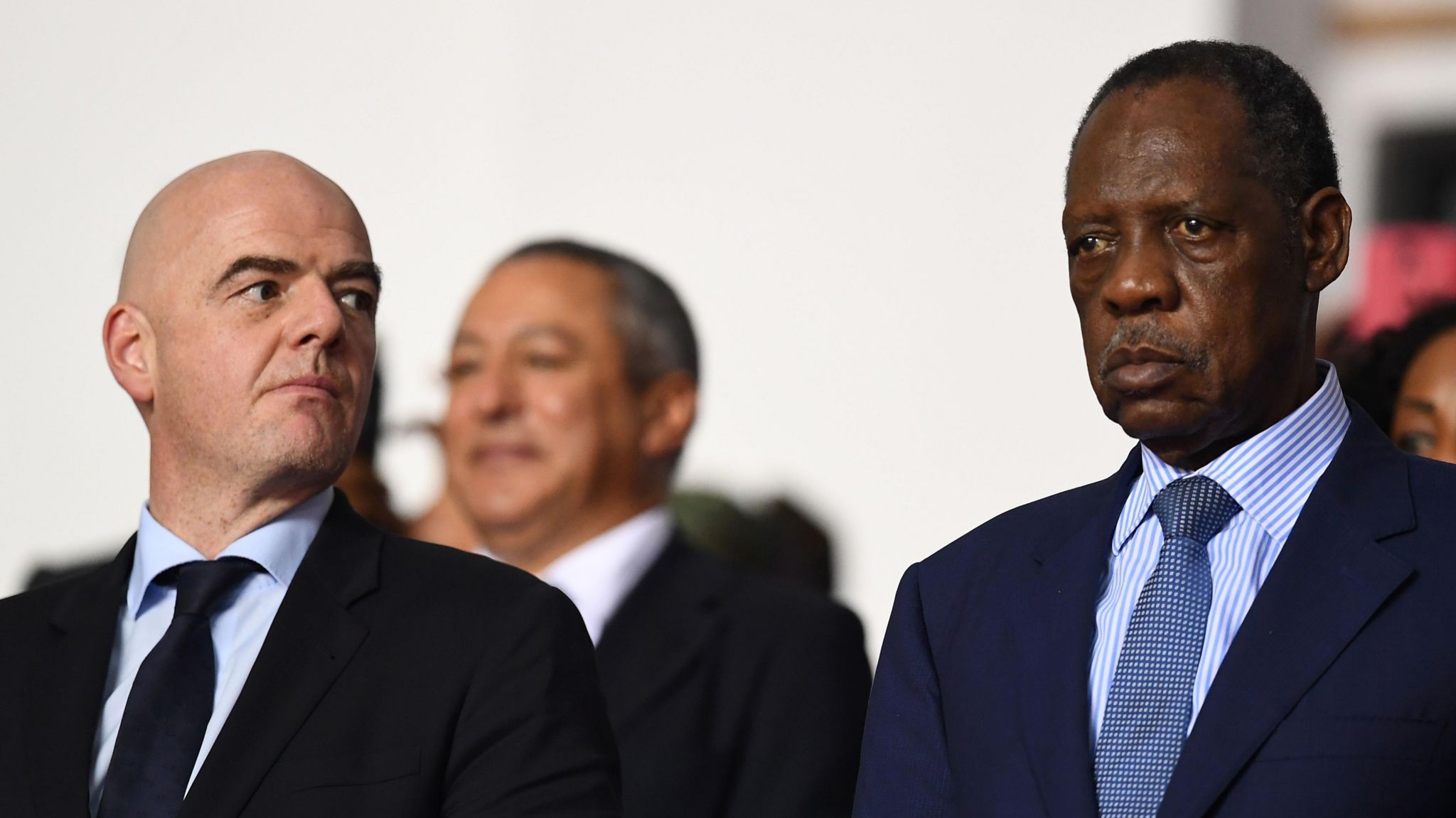 Image source: Getty Images
Image source: Getty Images
Image caption: Fifa president Gianni Infantini (left) gave his backing to Hayatou’s opponent in Caf’s presidential election in 2017
After an unsuccessful bid to become Fifa president in 2002, the beginning of the end of Hayatou’s Caf reign came in 2016 when elections to replace Blatter were held by Fifa.
The Cameroonian instructed Caf’s 54 members to back Bahraini candidate Sheikh Salman bin Ibrahim al-Khalifa, yet Gianni Infantino assumed the crown instead.
The Swiss-Italian was keen to see Hayatou removed from power and he was dethroned by the Fifa-backed candidate Ahmad in 2017.
However, the Malagasy became far more enmeshed in scandal than his predecessor ever had been – becoming the first Caf president to be banned by Fifa for breaching its ethics code.
Developments since Hayatou’s exit have given some of those who had sought to vote him out of office time to reflect on his legacy.
“The passing of Issa serves as a poignant reminder of the loss we have experienced since his exit from the realm of power in African football,” Musa Bility, the former president of the Liberian federation, told BBC Sport Africa.
“Each of us who opposed him should find the strength to apologise to this remarkable leader.”
On the very day that Hayatou’s one-year Fifa ban was overturned, during the staging of the 2021 Africa Cup of Nations in his homeland, he caught sight of Infantino.
Hayatou reportedly told him ‘You wanted me dead, but I am alive’.
The Cameroonian has now departed, with tributes pouring in and flags lowered to half-mast by Caf and the IOC.
Despite his faults, many believe he promoted the interests of African football better than most who went before or have followed since.
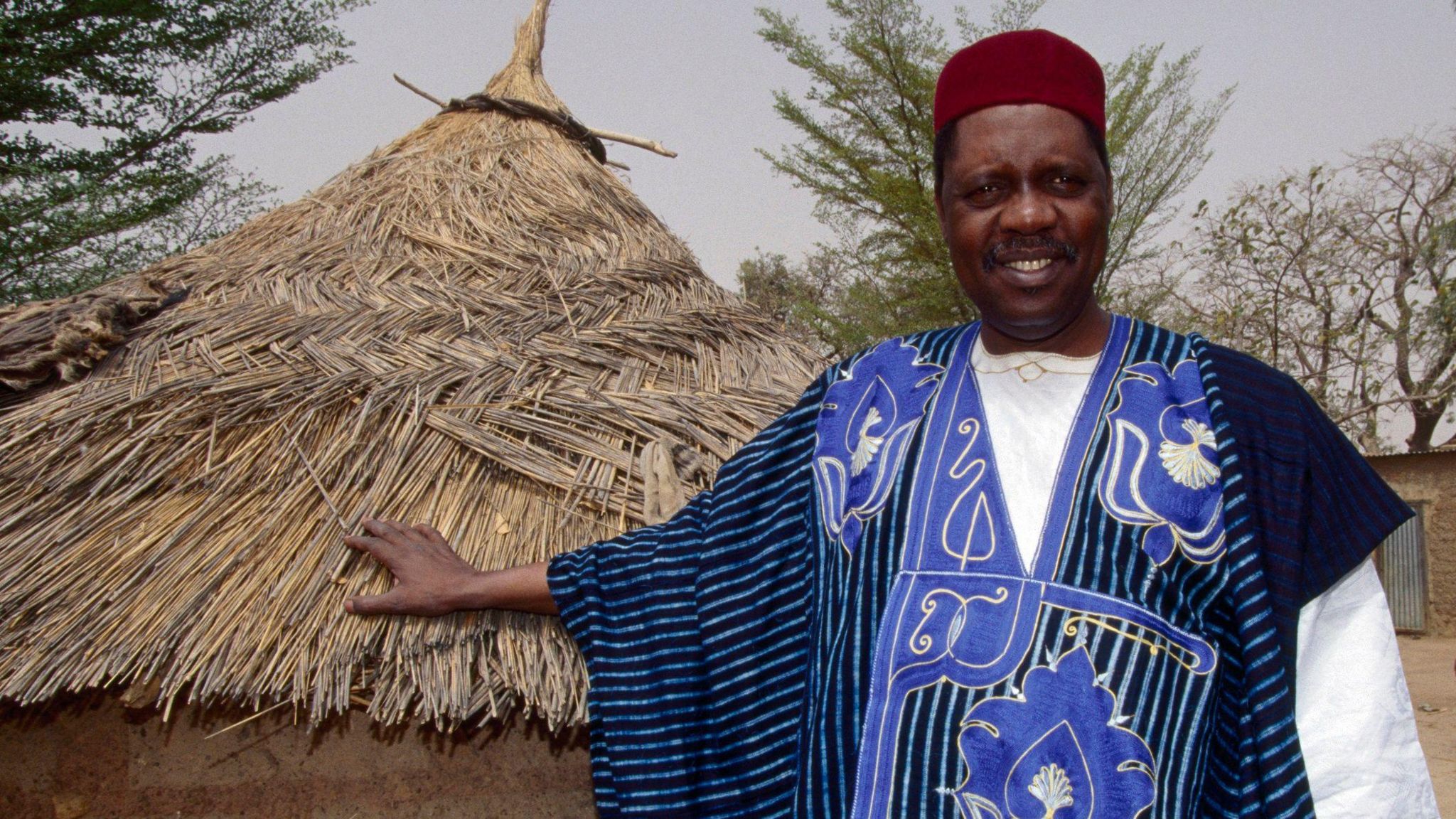 Image source: Getty Images
Image source: Getty Images
Image caption: Hayatou was the son of a local ruler from Garoua, northern Cameroon

